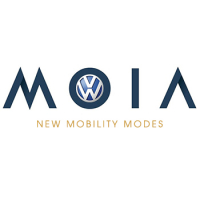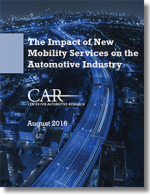The Impact of New Mobility Services on the Automotive Industry
Emerging trends in mobility technology, such as the rise of ride-hailing and car-sharing services, have led many industry analysts to offer their views on how these trends will affect the automotive industry, these efforts have resulted in highly conflicting visions of the future.
The concept of mobility is increasingly being adopted by planners, policymakers, and industry to describe the systems that allow people to move about their world.
This shift in language - from transportation to mobility - represents a shift in thinking about how a transportation system is best designed and managed.
Mobility is a user-centric concept - recognizing that transportation products and services must be responsive to the needs, habits, and preferences of travelers and society.
Numerous new passenger transportation options, collectively called new mobility services (NMS), have been developing for the past fifteen years.
These services offer transportation as an on-demand shared service, enabling users to have access to a vehicle (automobile, bicycle, van, etc.) for a short-term and on an as-needed basis.
New mobility services often blur the lines between public and private transportation, and between what is shared and what is owned.
New mobility services are enabled by emerging technologies and wireless connectivity that allow for more convenient, efficient, and flexible travel.
Carsharing, ridehailing, ridesharing, microtransit, bikesharing, and mobility-as-a-service are among the most noteworthy new mobility services currently being developed. Each has its own business model and underlying service characteristics.
Rapid urbanization, pollution, and congestion are just a few of the push forces that have prompted this wave of innovation in transportation. New mobility services are contributing to a mobility evolution.
They are part of an incremental change in travel behavior, especially in urban areas, toward a multimodal system that is less car-centric. Worldwide, this gradual change will allow traditional transportation players, automotive manufacturers in particular, to adapt and maintain their market position, despite the increasing diversification of the transportation sector.
This white paper highlights the findings of a report published by CAR entitled Effects of New Mobility Services on the Automotive Industry and aims to:
- Identify and describe new mobility services
- Describe how new mobility services are changing travel behaviors
- Present an analysis of how those changes will affect the automotive industry
What’s Related


Favorites





